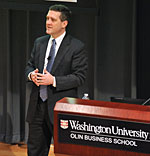Two prominent economists made headlines last week in visits to WUSTL when they shared their views on the economy and its recovery from the “Great Recession.”
Former Federal Reserve chief Paul Volcker and St. Louis Federal Reserve Bank President and CEO James Bullard, PhD, offered different perspectives on jobs, financial reform and the global economy.
One dared to suggest the need for increased taxes in the near future; one said the current crisis in Greece could slow the U.S. recovery.
Volcker shared his views at the annual dinner hosted by the Weidenbaum Center on the Economy, Government, and Public Policy May 3 at the Charles F. Knight Center.
Volcker told the capacity crowd that the U.S. economic recovery will be “a long slog” — three to four years — because of persistent unemployment and the decline in manufacturing.
As chair of President Barack Obama’s Economic Recovery Advisory Board, Volcker has been a leading proponent for reform of financial industry regulation. While criticizing Wall Street and its complex derivatives market as major causes of the financial meltdown, Volcker said he is optimistic that Congress will pass reform legislation this year.
Volcker also cautioned that the government must consider raising money through new taxes, be it on energy, carbon or perhaps a European-style value-added tax on goods at each phase of their production.
He admitted that new taxes are not advisable in the current economy but will be necessary for the government to stabilize its balance sheet. Full transcript of Volker’s remarks available on the Weidenbaum Center website.
Bullard remains optimistic about recovery

James Bullard
Reprinted with the permission of the Federal Reserve Bank of St. Louis
Later in the week, Bullard visited the Danforth Campus and was slightly more optimistic about the U.S. economy.
In his presentation to Olin Business School’s Century Club May 6, Bullard used a series of graphs and charts with the latest economic statistics indicating “continued signs of recovery” and “more positive news than negative news.”
Namely, he sees a continued downward trend in the unemployment rate and no signs of inflation.
Bullard was critical of financial reform proposals under consideration in Congress that would change the role of the Fed as bank regulator.
“The Fed should continue to supervise state member banks and bank holding companies of all sizes,” Bullard said. “Understanding the entire financial landscape helps the Fed make sound monetary policy decisions.”
Bullard did express concern about the current debt crisis in Greece and the European Union’s response.
He called Europe’s growth a “weak spot” in the global economy that has been slowly improving since the financial meltdown that ignited the recession in 2008.
Bullard’s presentation to the Century Club and video excerpts from a Q&A session on regulatory reform are available at the St. Louis Federal Reserve Bank website.